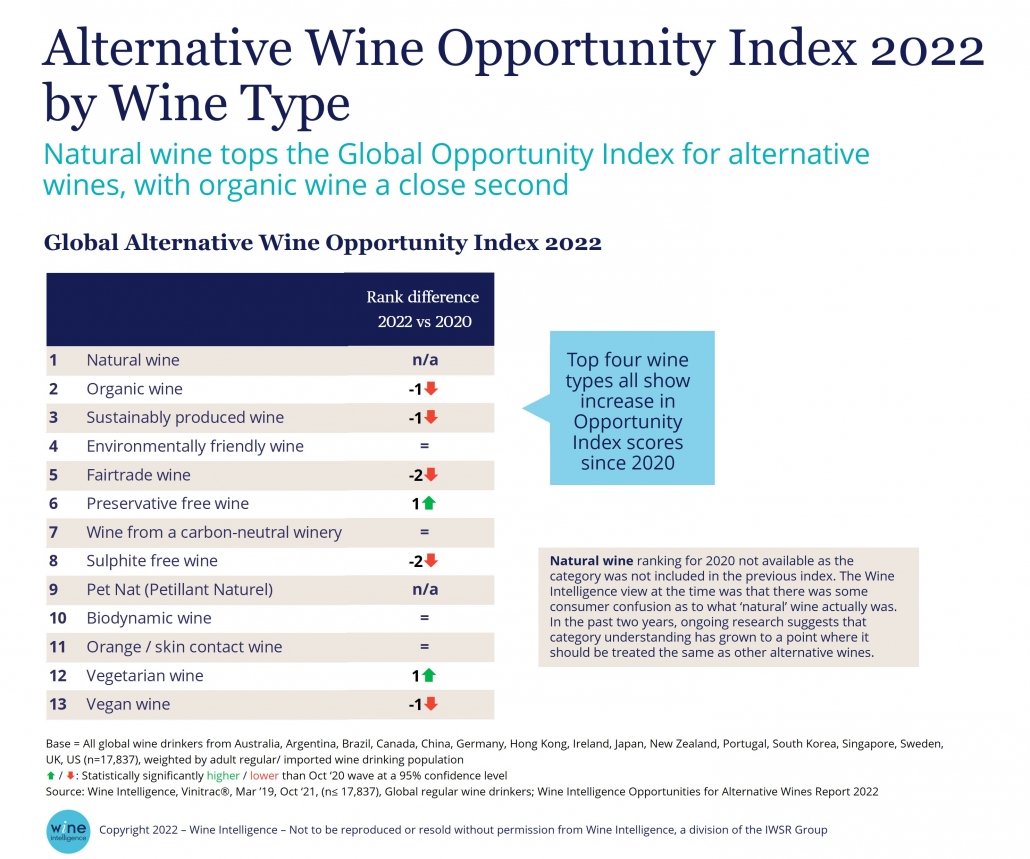The concept of sustainability – in all its forms and definitions – has become a powerful driver of consumer sentiment in recent years. Brands from categories as diverse as airlines and accountancy firms have rushed to burnish their sustainability credentials. Similar trends have also taken root in the global alcohol industry – and for good reason. According to data collected for the IWSR Covid Tracker 2021, nearly half of American adult drinkers of beverage alcohol (48%) and 70% of Chinese alcohol drinkers said they were ‘positively influenced’ to buy brands that had demonstrable environmental or sustainability credentials.
The history of sustainability and wine goes back longer than most industries. Organic wines have been a feature of upscale restaurant wine lists and independent stores since the early 1980s. Thanks to strong advocacy from its state retail monopoly, Systembolaget, organic wine in Sweden accounts for almost 1 in 4 bottles of wine sold in that market.
More recently, the wine category has witnessed further developments of sustainability. These include biodynamic wines, which take the concept of organic wine further by applying agricultural techniques developed by the philosopher of Rudolf Steiner (who also founded the Steiner Schools movement), and natural (or low-intervention) wines, which take the concept of sustainability down to a fairly basic level by allowing natural fermentation processes to take place free of any chemical inputs or engineered yeasts. A number of wine-producing countries and regions have also set up their own sustainability standards, and used their marketing muscle to incentivise producers to comply.
As one might expect, wine consumers are at least as keen on sustainability in general. In our latest Strategic Report, Opportunities for Alternative Wines, Wine Intelligence research found that between 56% and 67% of wine consumers across major wine markets (US, Canada, UK, Sweden and Australia) had a high connection with sustainability in general, judging from their answers to a number of statements about the subject.
However there seemed to be a disconnect between their broader attitudes to sustainability and their willingness to translate this desire into their wine purchasing behaviour. Among all regular wine drinkers, the willingness to pay more sustainable wines, or to opt for sustainable wines given the choice, fell to around a third of drinkers across the same markets.
This discrepancy between what consumers say they would like to do with regard to the environment and sustainable products, and what they actually do, is well documented. In a landmark Harvard Business Review article in 2019, Katherine White and two colleagues at the University of British Columbia note that the gap between desire and action in sustainability is wide – in fact, their research found near identical gap to the one we documented above. Their prescription for bridging it came down to a variety of factors, including social influence (people copy habits of others), the domino effect (people like to be consistent) and pitching messages that resonate at both a rational and emotional level.
However White and her colleagues concluded that getting people to buy in a sustainable way remains a major challenge, as there are plenty of reasons to revert to less sustainable alternatives – the (typically) higher price being one of the key dissuading factors.
The silver lining for the wine category, as documented in our tracking data, is that the usage trend appears to be moving in a positive direction. The Wine Intelligence Alternative Wine Opportunity Index, a compound measure of consumer engagement in wine categories including sustainable, organic, natural, biodynamic and Fair Trade, is showing gains across the board.
Within this group, the standout performer over the past two years has been natural wine. This sector has benefited from widespread advocacy over the past few years from within the wine trade, particularly the influential sommelier community, and can now be found on wine lists at many fashion-conscious bars and restaurants in major developed world cities.
What appears to set natural wine apart from many other ‘sustainable’ wine products is that its fundamental attraction is more focused on the intrinsic – the process in which the wine is made makes its taste profile very distinctive. This contrasts with the much more long-established organic wine, which is also continuing to build an audience, but at a less spectacular rate of growth. Organic wines may claim to offer a better consumer taste experience, but broadly organic’s selling point is more likely to be extrinsic – perceptions of the category as an ethical or sustainable choice.
That said, the deliberate strategy of Systembolaget in Sweden to list a growing number of organic wines in its retail stores has led Sweden to become one of the largest and most successful organic wine markets in the world, providing a good example of White et al’s “social influence” effect. Natural wine also seems to be benefiting from the same effect, among a more involved segment of the wine drinking population in larger cities such as London and New York. It may be that the sustainable wine market simply requires more of these social influence nudges to become acceptable in the mainstream.
You may also be interested in reading:


Leave a Reply
Want to join the discussion?Feel free to contribute!